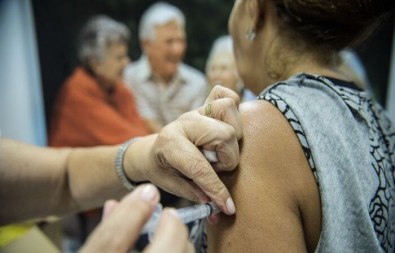Elton Allison | FAPESP . agency Researchers from the University of São Paulo School of Medicine (FM-USP) have found that some types of drugs used to treat autoimmune rheumatic patients, such as rheumatoid arthritis, are able to reduce the immune response to vaccines against COVID-19.
In the study, the results of which were a statement in the magazine nature medicinePatients vaccinated with CoronaVac, produced in Brazil by the Putantan Institute, were evaluated. It is still necessary to test whether the same effect occurs with vaccines from other laboratories.
make with the support From FAPESP and B3-Exchange, the research aims to evaluate the safety and efficacy of CoronaVac in patients with nine types of autoimmune rheumatic diseases.
Based on the findings, the authors are working to develop new vaccination strategies for these patients, which include suspending treatment a week or two before CoronaVac is applied and resuming it after vaccination, with the goal of improving the immune response.
“We have observed that some medications, such as glucocorticoids, as well as immunosuppressants, such as methotrexate and mycophenolate mofetil, and some biologics, reduce the immune response in these patients,” he says. FAPESP . agency Elisa BonvaFM-USP Professor and Study Coordinator.
“Based on this observation, we began to study some vaccination strategies, such as suspending the drug with mofetil for a week and methotrexate for two weeks before applying the vaccine,” Bonfa says.
According to the researcher, due to immunodeficiency, immunosuppressed patients – which include not only those with autoimmune diseases, but also those undergoing cancer treatment and transplants and those living with human immunodeficiency virus (HIV), are among the Others – are at high risk of having a low response to vaccines. Moreover, rheumatic autoimmune diseases can increase susceptibility to venous thrombosis.
In order to assess whether vaccines against COVID-19 are effective and safe for these people, FM-USP researchers followed 910 adult patients, who were treated in the rheumatology laboratory at Hospital das Clínicas, FM-USP, up to 40 days after receiving them. The second dose of CoronaVac.
“Patients are followed up in a Class III center and therefore have more severe cases of rheumatoid and psoriatic arthritis, as well as axial spondyloarthritis and other autoimmune rheumatic diseases, such as lupus erythematosus, vasculitis, Sjögren’s syndrome, systemic sclerosis, and inflammatory idiopathic myopathy syndrome. Antiphospholipids,” Bonfa explains.
Patient blood samples were analyzed for SARS-CoV-2 antibodies before and after 28 days and six weeks after complete vaccination with CoronaVac. The results were compared with 182 people without autoimmune diseases or not taking immunosuppressants, who made up a control group.
The results of the analyzes indicated that the immunizing agent was able to induce seroconversion of IgG antibodies in 70.4% in patients with autoimmune rheumatic diseases versus 95.5% in the control group.
“We observed a decrease in the immune response in these patients compared to the control group, which we consider to be moderate and within the criteria set by the World Health Organization. [Organização Mundial de Saúde]’ says Bonfa.
“The serological response rate of 70.4% is really very important for people who are immunocompromised or who are on immunosuppressive medications,” he says.
Up to ten days after the first dose of vaccination, when the response to the vaccine is not complete, 33 of the study participants contracted COVID-19. And after 40 days of this period, when the immune response to vaccination was already formed, only six patients became ill. Only four individuals required hospitalization and no deaths were recorded.
Bonfa said that this drop in cases among participants, from just 33 to six, occurred in reverse to the peak of records of new SARS-CoV-2 infections in São Paulo, which in the same period saw a 45% increase.
“The observation that ten days after the second dose there was a significant reduction in cases shows that the vaccine appears to have very good efficacy even in this group of immunosuppressed patients, who are more likely to develop an infection,” says the researcher.
He stresses, “This reinforces the recommendation to vaccinate these patients.”
priority group
According to the researcher, in addition to the increased risk of developing infectious diseases and developing into a serious condition, immunosuppressed patients have a higher incidence of comorbidities, such as high blood pressure and obesity, which are risk factors for COVID-19. Therefore, they should have been given priority from the very beginning of the vaccination campaign against the disease.
In addition, immunosuppressed patients have more difficulty “cleaning” the virus from the body than healthy people, which supports the development of mutations.
“Prioritizing the vaccination of this group is important not only for them, but also for the population in general, because in this way the risk of mutations can be reduced,” he says.
Article Immunity and Safety of Inactivated CoronaVac Vaccine in Patients with Autoimmune Rheumatic Diseases: A Phase IV Trial, by Ana C Medeiros-Ribeiro, Nadia E. Aikawa, Carla JS Saad, Emily FN Yuki, Tatiana Pedrosa, Solange RJ Fusco, Priscilla T. Rojo, Rosa MR Pereira, Samuel K. Shingo, Daniele Ko Andrade, Percival D . Sampaio Barros, Carolina Te Ribeiro, Giordano BH Devisa, Victor Ao Martins, Clovis A Silva, Marta H. Bonfa, it can be read at: www.nature.com/articles/s41591-021-01469-5.
This text was originally published by FAPESP . agency according to Licença Creative Commons CC-BY-NC-ND. Read the original here.

“Wannabe internet buff. Future teen idol. Hardcore zombie guru. Gamer. Avid creator. Entrepreneur. Bacon ninja.”


